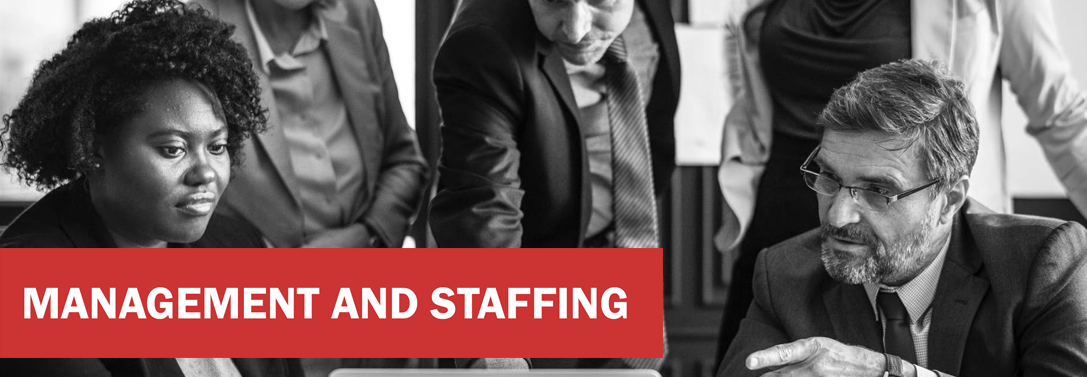
Nonprofit Management And Staffing
Discover the art of strategic management and effective staffing in our collection of education videos–dedicated to the unique needs of nonprofits and NGO’s. Dive into crucial facets of successful executive leadership, exploring everything from team building and volunteer coordination to performance management and conflict resolution. These array of lessons, from Top Nonprofit Sector Experts, illuminate the complexities of managing a nonprofit, offering you actionable insights and practical tactics to elevate your organization. You’ll find ways to assemble a passionate team, who shares your mission, with in-depth guidance on cultivating a positive work culture, fostering employee engagement, and keeping your staff motivated, regardless of the challenges that arise.

Thinking of opening a nonprofit thrift store? Before you dust off those donation bins, take a lesson from Kate Thoene, CEO of New Life Center., as she gives us a masterclass in turning a pile of secondhand shoes into sustainable impact. Spoiler: It’s not as easy as slapping a price tag on old lamps and hoping for the best.
At Hope’s Closet, the social enterprise Kate oversees, “we don’t take anything that makes you ask, ‘Should I donate this or toss it?’” That tough-love clarity is part of what keeps their thrift shop not just afloat—but thriving. From curated donation bins and strategic store layouts to voucher programs for survivors of domestic violence, Kate walks us through how her organization uses retail to empower recovery, generate unrestricted revenue, and build community loyalty.
She breaks down staff structure (a mix of full-time employees and 1,000+ volunteers), donation flow (“you need new items hitting the floor daily”), and even how color-coded tags help them cycle out stale inventory. Plus, we learn about their fruitful partnership with Big Brothers Big Sisters—where unsellable items are bought by the pound, keeping the store clutter-free and the landfill grateful.
Don’t miss how this 5,000-square-foot shop became a community engine, churning out real, trackable impact. Kate shares insights on metrics, bonus incentives, messaging at point-of-sale, and even the exciting possibility of store #2. And yes, there's a half-off sale where even the “rules” go on discount.
If you’ve ever wondered whether charity shops are worth the effort, Kate answers that with a resounding yes—as long as you’re ready to think like a retailer, hustle like a startup, and lead with mission.
"The more we sell, the more we help survivors of domestic violence." — Kate Thoene
#ThriftWithPurpose #thriftstores #TheNonprofitShow
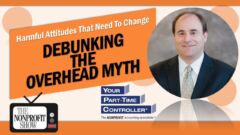
Are you still chasing a “low overhead” badge of honor? Gregg Indictor, Director at Your Part-Time Controller, confronts one of the nonprofit sector’s most persistent misinterpretations: the overhead myth. With cohosts Julia Patrick and Meico Marquette Whitlock, the conversation unpacks what "overhead" actually represents, why it’s often misunderstood, and how nonprofits can more accurately reflect their financial stewardship.
Gregg begins by demystifying overhead as merely the administrative costs necessary to support any organization’s operations—nonprofit or for-profit, saying, “There is no correct overhead ratio for any organization,” noting that effectiveness should be measured by mission impact, not accounting percentages.
This fast episode fully explores cost allocation, the process of categorizing and reporting expenses across functions—such as program services, management, and fundraising. Gregg walks through the Schedule of Functional Expenses found in audits and IRS Form 990, and explains how misallocating indirect costs can produce distorted financial portraits. His emphasis on methodology—such as time and effort tracking for personnel, or square footage for facility expenses—underscores the importance of reasonable and consistent cost assignment.
Gregg highlights a powerful metric: for most nonprofits, 80–85% of expenses stem from personnel and facilities. Yet not all of those costs are necessarily “overhead”—they could very well contribute directly to mission delivery, depending on how they are allocated.
One of the key moments involves Gregg’s perspective on restricted vs. unrestricted funds. He cautions against well-meaning development practices that inadvertently solicit restricted gifts, reducing an organization’s flexibility to cover essential functions. A simple shift in donor language—from “choose your program” to “support our mission”—can dramatically improve financial resilience.
As the trio discuss transparency and internal communication, Gregg advocates for cross-departmental access to financial information, encouraging organizations to present timely reports not just to leadership, but also to program and fundraising teams. This transparency supports better decision-making and breaks down operational silos.
In a moment of clarity, Gregg quotes Dan Pallotta’s Uncharitable: “We don’t want our generation’s epitaph to read: ‘We kept charities’ overhead low.’ What we want it to read is: ‘We changed the world.’” This reframing of the narrative away from efficiency metrics toward effectiveness and impact becomes the episode’s rallying point. You’ll learn a lot watching this!
00:00:00 Welcome and guest introduction
00:03:08 What is nonprofit overhead and why it matters
00:05:29 The problem with restricted funding
00:07:36 Understanding cost allocation
00:11:02 How overhead ratios are calculated
00:13:44 80–85% of expenses: what that really means
00:16:21 Allocating costs accurately and fairly
00:18:38 Why everyone in a nonprofit should understand finance
00:20:17 Internal transparency and financial reporting
00:22:06 Overhead myths vs. operational reality
00:24:20 Contributed vs. earned revenue
00:27:02 Changing the donor messaging to support sustainability
Follow the ongoing conversation at #TheNonprofitShow
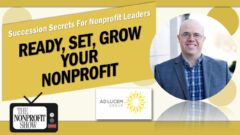
In an era marked by organizational strain and evolving workplace expectations, leadership must move beyond traditional fixes and embrace systemic transformation. Patrick Farran, PhD, MBA, co-founder of Ad Lucem Group, joins host Julia Patrick to dissect the true nature of burnout, succession, and sustainable engagement in nonprofit leadership.
Patrick challenges the prevailing assumption that burnout stems solely from overwork. “The number one cause of burnout is not overwork—it’s the loss of agency,” he explains, arguing that without autonomy, even meaningful work becomes draining. Rather than defaulting to micromanagement during times of stress, Patrick advocates for building cultures rooted in trust, purpose alignment, and shared responsibility.
Drawing from decades of executive coaching and organizational consulting, Patrick offers a framework built on three pillars: personal legacy, building others, and systems thinking. His advice is clear—leaders must be deliberate about cultivating capability in others and embedding processes that outlast any individual. This approach not only fortifies the organization but reduces the high failure rate of executive transitions.
He also introduces the concept of “job crafting,” citing research on hospital janitors who redefined their roles around meaning rather than task lists. This practice, when applied in nonprofit settings, can create clear pipelines for succession and foster resilience.
Another key theme is the embrace of constructive conflict. Patrick quotes Adam Grant: “The absence of conflict is not harmony—it’s apathy.” Healthy disagreement, he argues, is not a threat but a catalyst for innovation. Nonprofits should harness this energy to align purpose, improve communication, and prepare for inevitable turbulence.
Finally, Patrick outlines how appreciative inquiry—a strength-based framework—can transform leadership conversations and shift organizations away from crisis reactivity. By examining moments of excellence, teams can uncover hidden systems of success and replicate them in difficult times.
From strategic succession planning to reframing burnout and conflict, this episode is packed with research-backed guidance, timely analogies, and field-tested leadership philosophy. It’s a must-watch for nonprofit leaders dealing with today’s pressures. Follow the ongoing conversation at #TheNonprofitShow

How much should a fundraiser make—and why is it still taboo to ask?
Cohosts Julia C. Patrick and Tony Beall tackle the longstanding silence around nonprofit salary transparency. “There isn’t a whole lot of trust around this topic,” says Tony, “and it’s good for us to start talking about it.” What unfolds on this Fundraiser’s Friday episode is a candid, layered discussion about job titles, compensation expectations, and the complicated politics behind who earns what—and why.
Fundraising jobs are not one-size-fits-all. As Tony explains, “There are assistant positions, manager roles, directors, officers—each with its own accountability level, not just a paycheck.” But the sector’s tendency to obscure salaries makes it difficult for professionals to map their advancement. Julia adds, “Talking about salary used to be grounds for dismissal—higher up than reporting abuse. Think about that.”
The duo explore the overlap and confusion between job titles—director vs. officer—especially across healthcare, higher ed, and arts institutions. While some roles sound loftier than others, Tony argues that “titles are often interchangeable,” driven less by function and more by organizational type.
Experience doesn’t always translate to higher pay either. “Ten years in doesn’t mean a pay jump if you’re not at the right org,” says Tony. Instead, professional development, certifications, and even microlearning now influence compensation more than tenure. The hosts underscore how nonprofits are slow to reward results: even fundraisers who exceed goals may still hit salary ceilings unless they leave for a new organization.
And it’s happening often—turnover is the sector’s open secret. With development staff staying an average of just 19 months, organizations are hemorrhaging talent due to stagnant pay structures and institutional inertia. “You can prove you’re worth it, hit all your metrics—and it still might not matter,” Tony warns.
Remote work has added fuel to the fire. Salaries are increasingly influenced by where you live, not where your nonprofit is based. “You may be doing New York-level work from Omaha—but don’t expect New York pay,” says Julia. It’s an unspoken recalibration that’s forever altered the labor equation.
For fundraisers at any stage in their career, this episode doesn’t just demystify nonprofit salaries—it demands that we start having these conversations openly and often.
00:00:00 Welcome and intro
00:02:00 Why salary talk is still taboo
00:03:30 Fundraising job title levels
00:05:15 Accountability vs. salary
00:07:00 Director vs. Officer roles
00:08:45 Career advancement limitations
00:11:00 Should salaries be posted?
00:14:00 Location-based salary differences
00:17:00 Experience vs. skillset
00:20:30 Education and certifications
00:22:00 Proving value through metrics
00:26:00 Who pays the most in the sector?
00:27:30 Passion vs. paycheck
00:28:50 How to keep the salary convo going
Follow the ongoing conversation at #TheNonprofitShow

master class on the untapped power of volunteerism—with a call to rethink how we attract, support, and retain volunteers—led by guest expert Kirsten Wantland, Manager of Customer Best Practices and Enablement at Bloomerang,
Kirsten, who holds credentials as a Certified Nonprofit Consultant and Certified Development Executive, brings both frontline and strategic expertise. With her deep background in fundraising and nonprofit leadership, she makes a bold case for managing volunteers with the same intentionality as donors. Her rallying cry? “Recognize behaviors over capacity.”
Too many nonprofits still treat volunteer management as an afterthought—focused on day-of logistics or generic thank-yous. But Kirsten argues for a proactive, data-informed approach that starts well before a volunteer steps foot on site. From setting clear expectations in role descriptions to acknowledging service hours as contributions worth over $34.79 per hour, this learning session delivers some super strategies that can translate into real organizational value for your NPO.
Volunteers aren’t just a feel-good bonus; they are a form of human capital that, when properly stewarded, can evolve into loyal donors and long-term advocates. “If you think of someone donating 10 hours,” Kirsten explains, “you’re looking at the equivalent of nearly $350 in economic impact. How many of your donors give that much in a single gift?”
She encourages nonprofits to:
· Communicate expectations clearly and respectfully.
· Track volunteer hours just like financial contributions.
· Plan intentional follow-ups after service.
· Use personalized recognition—by name, by role, by impact.
· Share volunteer stories in annual reports and community messaging.
Kirsten also addresses a long-standing sector taboo: asking volunteers to give financially. Her advice? Let the volunteer decide. Many already feel deeply connected to the mission and are primed for deeper engagement if offered meaningful opportunities.
This is a must-watch for anyone building or revamping a volunteer program. Whether you’re a small grassroots org or a large multi-program agency, Kirsten delivered a powerful reminder: treating volunteers like integral partners, not just helpers, can boost retention, deepen engagement, and even expand your donor base.
00:00:00 Welcome and guest intro
00:01:40 Kirsten’s credentials and new role at Bloomerang
00:03:00 The impact of formal nonprofit education
00:06:20 Defining volunteer clarity and role expectations
00:09:30 Orientation and onboarding strategies
00:11:00 Recognizing volunteers effectively
00:14:20 Tracking volunteer hours and value
00:16:30 Volunteers as non-monetary donors
00:20:00 Creating a follow-up plan post-volunteering
00:22:00 Should volunteers be asked for donations?
00:24:00 Personalized engagement based on behavior
00:27:00 Volunteer storytelling and long-term commitment
Follow the ongoing conversation at #TheNonprofitShow
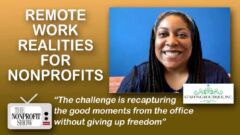
As remote work settles into the nonprofit landscape, what does the future of flexible staffing really look like? Dana Scurlock, Director of Recruitment at Staffing Boutique, returns to unpack this pressing issue—and she doesn’t shy away from the complexity.
Dana brings clarity to the evolution of work-from-home (WFH) culture. Initially a crisis response, WFH has now become a defining workplace feature—but not without its complications. “There's that last 20% that is still kind of missing when I have every one of my staff working from home,” she notes, identifying a growing tension between productivity and presence. Her insight? A hybrid future, tailored to roles and individuals, is the most sustainable path.
“People realized how much work could actually be done from home—and how much they saved on commuting. But now the challenge is recapturing the good moments from the office without giving up the freedom we’ve gained.”
Dana highlights the value of defining expectations early in the recruitment process, especially in a labor market where job candidates expect flexibility—and employers risk losing top talent if they can't deliver. She shares how Staffing Boutique remains nimble in supporting nonprofit clients with both temporary and direct-hire roles, ensuring cultural fit, skills alignment, and strategic placement.
The conversation peers into overlooked topics: professionalism in Zoom culture, generational challenges in remote onboarding, and the need for virtual branding consistency. Dana encourages nonprofits to take remote work as seriously as in-office dynamics: “Maybe as an organization, everybody has the same background… there’s no reason branding can’t extend to Zoom.”
Dana’s expertise shines in offering practical solutions: shared in-office days for hybrid teams, clear time zone and availability protocols, and setting up accountability systems before remote work begins. And she makes a compelling case for investing in younger or less experienced hires who may lack foundational office experience.
Dana leaves us with a new lens on what it means to manage talent, connection, and output in a decentralized world. If your nonprofit is still navigating remote staffing, this is the conversation you didn’t know you needed. Follow the ongoing conversation at #TheNonprofitShow
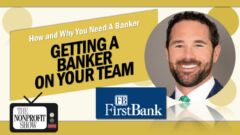
Our hosts chatted with Jeff Young, Senior Vice President at First Bank, about why your nonprofit absolutely needs a good banker—and it's probably not for the reasons you think. Jeff breaks down exactly why banks see nonprofits as desirable clients and how having a strong relationship with your banker can open doors to some unexpected benefits.
Jeff shared that banks don't just see nonprofits as checking and savings accounts; they genuinely want to support organizations doing good in their communities. Surprisingly, there's even federal encouragement under the Community Reinvestment Act (CRA), where banks get ratings for their community engagement—so working with nonprofits actually helps banks, too. "Good banks want to do good for their communities," Jeff explains, "and what better way to do that than support the organizations that actually have boots on the ground?"
But how do you make sure you're getting the most out of your banking relationship? Jeff emphasized asking the right questions—especially whether your bank has experience specifically working with nonprofits and if they offer special products like discounted fees and preferred rates. Also crucial is finding someone at the bank who genuinely believes in your mission. Jeff mentioned that bankers who truly connect with your organization's purpose will become internal advocates, helping secure better deals and even promoting your cause within their network.
Should your banker join your nonprofit's board? It's possible, Jeff says, but proceed carefully. He highlights the importance of maintaining clear boundaries to avoid conflicts of interest, especially when it involves lending and financial incentives. A better practice might be for the banker to provide advice while another team member handles specific transactions.
Jeff also clarified the roles of various financial professionals on nonprofit boards, explaining that accountants look at historical financials and compliance, investment professionals focus on asset management, and bankers are forward-looking, helping nonprofits strategically plan growth and manage risk. Having these diverse perspectives ensures stronger decision-making.
Lastly, Jeff gives practical advice for organizations looking to deepen their banking relationships. Start with your local branch manager, ask about nonprofit-specific services, and leverage LinkedIn to find bankers already active in your community. He also encourages tapping your current board's network, as existing members often have strong banking relationships that can benefit your organization.
The conversation wraps up with an engaging look at best practices for nonprofit financial management, highlighting that proactive, relationship-based banking is always better than reactive scrambling when problems arise. By building solid relationships with bankers early, nonprofits can secure more than just financial support—they gain committed partners who are truly invested in their success.
00:00:00 Introduction to Jeff Young, First Bank
00:02:28 How banks specifically support nonprofits
00:03:42 The Community Reinvestment Act and bank incentives
00:06:55 Importance of asking your bank the right questions
00:08:36 Top questions nonprofits should ask their banker
00:10:27 Should your banker be on your nonprofit board?
00:13:17 Differences between accountants, bankers, and investment advisors
00:15:36 Building relationships with your banker
00:17:59 Leveraging your current board for banking connections
00:20:25 Navigating conflicts of interest with bankers
00:22:46 Managing multiple bank relationships and risk
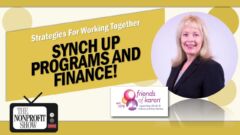
When finance and mission meet, it's often a delicate dance—but Terri Sorrentino, Director of Finance and Administration at Friends of Karen, shows that collaboration can be both powerful and transformative. In this candid and compassionate episode, Terri walks us through how her organization supports families of children facing life-threatening illnesses and how operational departments—often hidden from public view—become the engine behind meaningful impact.
FriendsOfKaren.org serves over 1,200 children annually, most battling cancer. What sets them apart? A comprehensive approach that uplifts the entire family—from social workers who visit homes and hospitals to child life specialists focused on siblings, all delivered with empathy and financial relief. Yet behind this emotional mission is a finely tuned financial machine—and a finance leader who sees herself not as a gatekeeper, but a guide.
Terri shares the often unseen tension between program needs and accounting rules, especially in emotionally charged scenarios. "Everyone has their role and every role is important...we're all trying to get to the same place, which is to help the families," she shares. Her approach centers on open communication, mutual respect, and ongoing staff education on budgeting and reporting.
Terri also dives into the evolving demands of grant reporting, emphasizing that funders now want more than expense breakdowns. They seek data-driven impact narratives that quantify emotional and advocacy-based work—especially the cost of social workers, a vital but often overlooked pillar of the mission.
This informative dialog explores how organizations can better prepare for audits without compromising compassion, and how relationships between finance, fundraising, and programming must be built on shared goals, not silos. Through storytelling and systems thinking, Terri exemplifies how to lead with heart and structure—ensuring that every dollar, spreadsheet, and report ultimately serves the mission.

Drew Moran, Chief Development Officer at Nourishing Hope, joins our cohosts,Julia Patrick and Sherry Quam Taylor, for a conversation that blends visionary thinking with practical strategies. From the moment the discussion begins, you’ll see that this is more than a typical food pantry story. Drew’s journey—from volunteer manager to a leader at a $20 million organization—illustrates how a commitment to innovation and compassion can drive exponential growth. You will be energized by the candid dialogue on marrying development and technology to better serve communities in need.
At the heart of the conversation is the imperative for nonprofits to invest in smart technology. Drew provides data, making a clear point: digital tools are not a luxury but a necessity for modern service delivery. By integrating a CRM, electronic medical records, and online ordering, Nourishing Hope streamlines operations, attracts forward‑thinking funders, and reduces barriers, all while honoring the dignity of the clients it serves.
Nourishing Hope, formerly Lakeview Pantry, has transformed over its 55‑year history, leveraging technology to expand its reach beyond Chicago’s north side. Under Drew’s leadership, the pantry launched the city’s first online market in 2019 and recently celebrated its 100,000th service. Combined with free mental healthcare and social services for over 55,000 individuals, the organization delivers more than 200,000 distinct services each year. This wrap‑around approach ensures every person who walks through its doors receives not just a meal, but respect and the tools needed to thrive.
Sherry and Julia spotlight the importance of a values‑aligned team and trust‑based philanthropy in driving impact. Drew emphasizes that fostering a culture of flexibility and abundance enables volunteers, staff, and donors to become co‑creators of change. From recruiting 7,000 annual volunteers to partnering with visionary foundations, the organization’s success hinges on building authentic relationships. This fast paced episode offers an actionable blueprint for nonprofit leaders seeking to adopt an entrepreneurial mindset—one that invites risk, prioritizes client experience, and leverages strategic partnerships to achieve sustainable growth.
Whether your mission is feeding families, providing mental health support, or reimagining service delivery in your community, this episode delivers the inspiration and insights needed to turn bold ideas into reality.
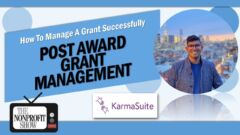
We are joined by Srikar Chinam, CEO of KarmaSuite, for a conversation that flips conventional grant thinking on its head. While most nonprofit leaders pour their energy into winning grants, Srikar urges the sector to focus just as hard—if not more so—on what comes after the win: post-award grant management.
Srikar explains that managing grants isn't just about compliance; it's about aligning multiple stakeholders, vocabulary sets, and reporting requirements—all while staying within highly specific timelines and budgetary restrictions. “It’s absolutely a spreadsheet nightmare out there,” he says, describing the all-too-familiar scenario of finance teams scrambling to reconcile expenses manually in donor-specific formats. For organizations juggling five to seven grants or more, the administrative load becomes unsustainable!
The conversation digs into why nonprofits often find themselves underprepared for this reality. “If you leave money on the table, that means the donor has missed their impact goals because of you,” warns Srikar, pointing to how such gaps can erode credibility and diminish future funding opportunities.
From federal grant freezes to the internal silos between development, finance, and programming, the conversation paints a vivid picture of a sector straining under outdated processes. Srikar shares that Karma Suite is designed not to replace accounting systems, but to sit atop them—removing 75% of the manual work currently managed through spreadsheets and late-night email chains.
One of the most impactful observations in the episode? The disconnect in language between departments and between nonprofits and funders. “Programs control the spending, but they’re not finance experts—and finance teams don’t always have the program context,” says Srikar, emphasizing the importance of connective tools that unify these voices.
From fiscal uncertainty to renewed donor expectations, the stakes have never been higher. But KarmaSuite’s tech-forward solution feels approachable, logical, and needed. With user-friendly integration and swift onboarding, it’s a promising answer to a huge overlooked problem.
00:00:00 Welcome and guest introduction
00:01:49 What is Karma Suite?
00:03:03 Why grant management is more than getting the check
00:04:30 Restrictions, expiration dates, and manual allocation
00:06:38 Spreadsheet overload: why current tools fall short
00:11:02 Disconnect between finance, programming, and fundraising
00:13:51 Grant mismanagement: how common is it?
00:16:21 Understanding funder expectations and impact goals
00:19:01 Software, process, and people: what’s missing
00:22:23 Federal funding freezes and reimbursement delays
00:24:56 Accuracy in reporting matters more than ever
#GrantManagement
#NonprofitFinance
#ImpactStrategy
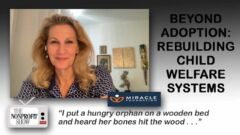
What does it take to reimagine child welfare on a global scale? Caroline Boudreaux, Founder of the Miracle Foundation, shares her extraordinary evolution from corporate life to global changemaker. Her journey began on a spontaneous trip to India where, on Mother’s Day in 2000, she met a group of orphaned children—and one moment changed her forever.
“I put a hungry orphan on a wooden bed and heard her bones hit the wood. I’ve never been the same,” Boudreaux recalls.
Originally launching Miracle Foundation as an international adoption agency, Caroline soon realized that adoption couldn’t scale fast enough to match the need. She pivoted. Then, another revelation: 80% of institutionalized children actually had living family. “We couldn’t just make orphanages better anymore—we had to help children go home,” she shares. That shift required a new model, a bold strategy, and a lot of resilience.
The organization began empowering ‘kinship care’—supporting extended families to take children back in by addressing barriers like housing, education, or income. Then came Thrive Well: a transformative app that puts this care model into the hands of over 30,000 social workers, enabling systems change at scale.
This inspiring discussion adds in the role of healthy board dynamics, founder self-awareness, and breaking through the myth that only “rich people” give. “You're not looking for donors with money,” Caroline says. “You’re looking for souls who want to do something bigger than themselves.”
Her metaphor? “We’re all jumping into the river to save babies. But someone has to look upstream to stop them from falling in.”
This conversation will challenge your assumptions, ignite your passion for systemic change, and offer inspiration for every nonprofit leader navigating evolving missions and growing impact.
00:00:00 Welcome to Caroline Boudreaux
00:01:29 How a trip to India sparked a mission
00:04:14 The moment that changed everything on Mother’s Day
00:07:10 Founding the Miracle Foundation
00:08:50 Early struggles and pivot from adoption
00:11:18 Discovering most “orphans” had families
00:13:03 The kinship care model explained
00:16:19 Partnering with Indian government and local leaders
00:17:40 Launching the Thrive Well app
00:20:01 Founder syndrome and building a strong board
00:21:22 Metaphor: saving babies vs. stopping them from falling in
00:23:22 Finding the right donors: look for souls, not dollars
00:25:27 The journey of learning, pivoting, and systemic change
00:27:08 Vision for a world without orphanages by 2040
#FamilyFirst #MiracleFoundation #SystemsChange
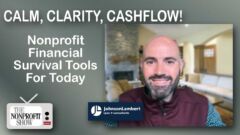
Paul Preziotti, CPA and partner at Johnson Lambert, joins co-hosts Julia Patrick and Meico Marquette Whitlock to provide a grounded, real-time financial snapshot of the nonprofit sector in 2025. As Paul begins, “Each month, it’s like, oh, that happened… now that happened,” capturing the fast-moving nature of today’s funding landscape.
The hosts and guest explore lessons learned from past crises and how nonprofits must evolve their planning models, including annual board and staff financial trainings, contingency-based budgets, and integrating cash flow analysis into strategic decision-making. Paul emphasizes that scenario planning is not a one-time task, but an organizational mindset: “You can’t do this overnight… you need to build in review time at all levels—starting with the board.”
The conversation digs deep into scenario planning—why it’s essential, and how it gives nonprofits a flexible roadmap when the future is uncertain. Gone are the days of assuming government funding is reliable. Preziotti says, “Even if your agency isn’t one of the ones in the news, I think you have to think about a scenario in the future where that funding doesn’t exist.”
The trio also address the communication gap between finance professionals and non-financial staff or board members. Paul and Meico discuss creating a budgeting culture that empowers all roles with the right knowledge and confidence to engage in financial discussions—without fear of judgment—adding that staying calm and building a supportive tone at the top helps organizations weather instability with resilience.
Outsourcing is presented as a flexible and cost-efficient solution, especially for smaller nonprofits. Whether outsourcing payroll, the CFO role, or just the budget process, it’s all about customizing help where it's most needed e.g.tailoring financial communication for diverse board members, using dashboards, infographics, or narrative reporting as appropriate.
00:00:00 Welcome and Introduction
00:01:52 Meet Paul Preziotti from Johnson Lambert
00:03:14 Nonprofit Budget and Funding Uncertainty in 2025
00:05:22 Why Scenario Planning Matters for Nonprofits
00:07:18 Lessons Learned from COVID and Natural Disasters
00:08:54 What Non-Financial Board Members Should Know
00:11:14 How Smaller Nonprofits Can Manage Scenario Planning
00:12:00 Outsourcing Financial Roles as a Cost-Saving Strategy
00:14:50 Building a Culture of Budgeting and Communication
00:17:23 Training Financial Staff to Communicate Clearly
00:21:02 How to Communicate Finances to the Board
00:23:35 What Boards Should Really Focus On Financially
00:25:44 How to Stay Calm During Financial Uncertainty
00:28:16 Sector-Wide Warnings and Final Thoughts
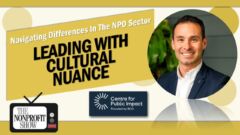
Dr. Pierre Berastaín, Regional Director at the Centre for Public Impact, invites us into a powerful conversation about leadership, cultural humility, and living with integrity across lines of difference. With warmth and depth, Dr. Berastaín shares how personal identity can be a source of strength in leadership—not something to minimize or check at the door.
"We all lead from a cultural lens, whether we name it or not," Dr. Berastaín explains. "The danger isn’t bringing your culture into leadership—the danger is bringing it in unconsciously and expecting it to be the norm for everyone."
Dr. Berastaín’s personal journey fuels his systems change work. His role at CPI—a nonprofit incubated by Boston Consulting Group—blends macro strategy with community-rooted implementation. The goal: reimagine how governments and public institutions serve people, especially those pushed to the margins.
At the heart of this discussion is an honest reckoning with cultural difference and a plea to bring one's full self into leadership. “Cultural humility isn’t about shrinking yourself,” he shares. “It’s about knowing yourself well enough to make room for others.”
The conversation explores what it means to acknowledge culture without stereotyping, the impact of asking, “What are you?” and how silence—intended to be safe—can sometimes feel like erasure. Dr. Berastaín advocates for “relational warmth before analytical interest,” encouraging listeners to shift from tokenizing curiosity to reciprocal connection.
He also offers practical tools for introspection: therapy, spiritual grounding, and forming a “personal board of directors” who challenge and support growth. These elements, he says, are vital in cultivating not only emotional intelligence but the capacity to lead with vision.
By the end of the chat, with host Julia Patrick, it’s clear that Dr. Berastaín’s leadership is not performative—it is personal, deliberate, and anchored in truth. And he challenges all of us to ask: What are we carrying into the room?
This episode is a must-watch for nonprofit professionals, board leaders, and changemakers looking to lead with depth and humanity in today’s increasingly complex world.
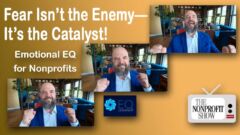
In a moment of transformational clarity, life and leadership coach George “Iceberg” Miller addresses what so many in the sector struggle with but rarely name: fear. Hosted by Julia Patrick, this conversation dares nonprofit leaders to face their internal barriers and lead from a place of emotional intelligence.
“We train ourselves out of even feeling anxiety and fear,” George says. But instead of rejecting fear, he challenges us to embrace it as a guide—not a threat. With heartfelt stories and grounded strategies, he redefines fear as a powerful source of data and growth. “What if we change that to—no, this is part of life?”
Together, the duo unpack the burnout crisis plaguing the nonprofit sector, especially among development professionals who rarely stay longer than 19 months. But rather than despair, George offers a hopeful alternative: presence. “All I did was say, ‘I’m angry.’ And it led to the most productive meeting of my career.”
From volunteer teachers who avoid burnout by staying connected to meaningful work, to financial leaders unlocking emotional resilience through micro-interactions, George shows that radical change begins within. His vision is clear: leadership isn't just about competence—it's about relational courage.
For anyone navigating budget cuts, burnout, or policy shifts, this episode is a masterclass in transforming fear into fuel. “If I can allow myself to feel that fear, stop criticizing myself for it… then I can create something new.”
Let this dynamic session be your invitation to pause, breathe, and reimagine your leadership—not as something to fix, but as something to feel.
00:00:00 Welcome introduction
00:03:46 Recognizing fear in nonprofit leadership
00:05:06 Reframing fear as useful, not wrong
00:07:01 Burnout and emotional suppression in development roles
00:09:04 Avoid burnout through meaningful service
00:11:42 Can emotional growth happen quickly?
00:13:22 Emotions as foundational leadership data
00:17:06 A single sentence that changed a team
00:21:03 Leaders modeling emotional presence
00:22:44 Fear, change, and historical perspective
00:25:52 Using anxiety to fuel creativity and hope
#EmotionalIntelligence #NonprofitLeadership #FearToFriend

It’s Fundraiser’s Friday—and we engage in a candid, layered conversation about one of the sector’s least addressed yet most persistent realities: stress. Specifically, the stress experienced by nonprofit fundraisers who juggle mounting expectations, emotional labor, event overload, and relentless revenue goals.
Cohost Julia Patrick opens with a sobering observation: “We can’t, as a sector, keep fundraisers going. They burn out and leave—an average tenure of only 18 months.” This sets the tone for a deep dive into the sources of that burnout and practical frameworks to address them. Cohost Tony Beall offers a powerful, centering reminder: “Give yourself the grace and accept that you need these things for yourself. There’s no guilt in taking care of the caretaker.”
Together, they examine six categories of stress fundraisers commonly endure: revenue pressure, donor expectations, event management demands, campaign overload, internal organizational scrutiny, and peer isolation. Instead of simply bemoaning these conditions, the cohosts provide tactical insight. From outsourcing logistics and investing in professional benefit auctioneers, to building strong volunteer committees and peer support networks, they propose both mindset shifts and structural solutions.
Tony emphasizes the importance of open and honest communication—up, down, and across the organization—as one of the most effective antidotes to mounting stress. Equally essential, Julia insists, is understanding the often-forgotten emotional toll of donor relationships and campaign deadlines, which can be exacerbated by unrealistic leadership expectations or outdated traditions like “we’ve always done this event.”
What emerges is a roadmap for healing a profession at risk. This isn’t just an episode—it’s a resource, a reset, and a reaffirmation for nonprofit professionals who need permission and tools to stay in the work they love.
00:00:00 Welcome to Fundraisers Friday
00:01:00 Fundraiser burnout and short tenure
00:02:00 Revenue pressure and mental strain
00:05:00 Open communication as stress management
00:07:35 Donor relationships and expectation stress
00:10:00 Fundraisers as accidental event managers
00:13:15 Return on effort for fundraising events
00:16:00 Volunteer committees and shared ownership
00:18:10 Benefit auctioneers and event ROI
00:21:00 Campaign overload and tech tools
00:24:00 Internal scrutiny and team pressure
00:27:00 Peer support and professional associations
00:30:00 Final takeaways and call for self-care
Follow the ongoing conversation at #TheNonprofitShow
